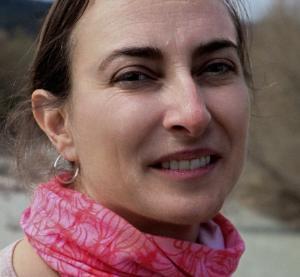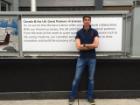Spotlight: Erika Fernandez-Vizarra
 I grew up in Huesca, a small city in the north of Spain very close to the Pyrenees. My dad is also a Huesca native, but my mum is from the United States. Thanks to this, I learned English and had the chance to travel outside Spain from a very young age, something that has been very helpful during my development as a scientist.
I grew up in Huesca, a small city in the north of Spain very close to the Pyrenees. My dad is also a Huesca native, but my mum is from the United States. Thanks to this, I learned English and had the chance to travel outside Spain from a very young age, something that has been very helpful during my development as a scientist.I have been interested in science as long as I can remember. Science was always my favourite subject all throughout school and whenever I had the chance, I read books and magazines with scientific content. My brother once said that I was the “most boring person in the world”, always in my room reading, but for me that was a lot of fun… I guess I was just a geek!
My main interest was always the natural sciences and I was always fascinated with biochemistry and physiology, I think it is amazing to get an understanding of the processes that keep us alive and healthy.
During my high school years, I always thought I was going to study medicine, but in the end I didn't follow that path. Since I was more interested in the physiological processes at the molecular level, I decided to study Chemistry at University of Zaragoza. I earned my traditional five-year degree in Chemical Sciences from the University of Zaragoza in 1998. During the summer between the fourth and fifth year of my degree, I did an internship at the Department of Biochemistry and Molecular and Cellular Biology in Prof Julio Montoya’s laboratory. Since his return from Giuseppe Attardi’s lab in Caltech, Julio has studied different aspects of the small genome contained in our mitochondria, the mitochondrial DNA (mtDNA) from its expression and regulation, to the diseases associated with its mutations. The geek in me thought that it was one of the most fun and interesting summers I had ever had. From that moment there was no way back; I have been interested and working on mitochondrial biology and pathology ever since.
After finishing my degree, I joined Prof Montoya’s lab as a graduate student and worked with Dr Patricio Fernandez Silva, first funded by the city of Zaragoza with a one-year grant, and later funded by the regional government of Aragon with a 4 year PhD scholarship. I obtained my PhD in 2005 with my dissertation concerning mtDNA expression regulation in different tissues by thyroid hormones.
After that, my mum wanted me to go to the USA for a postdoc position, but I decided to stay in Europe and joined Dr Massimo Zeviani’s laboratory in the Italian National Institute for Neurology ‘C. Besta’ in Milan. Massimo was (and still is) a world reference in the field of mitochondrial diseases. My training and research had been very basic science up to that point but during the time in Milan I learned a lot about disease and genetics - my dream! I also contributed to the lab with my knowledge and techniques for studying mitochondrial biogenesis. I was first there through a postdoc position funded by the EU through an international consortium of different labs interested in mitochondrial disease. Soon after I obtained a Marie Curie Fellowship, I left Massimo’s lab at the end of 2008 to go back to my old department in the University of Zaragoza thanks to the ‘Juan de la Cierva’ program to reintegrate Spanish researchers. After working in Jose A. Enriquez’s laboratory for about a year and a half, I got a ‘Miguel Servet’ Fellowship to start my independent research group in the context of the Spanish National Healthcare System. Doing research in a lab in a hospital - my dream come true again! Unfortunately, the financial crisis during that period hit Spain really hard and funding for research was extremely scarce, especially for a young researcher based in a small institute trying to make her way. In any case, I am very proud of my scientific and personal achievements during that time, considering the limited resources I had.
In 2013, Massimo Zeviani, my former postdoc mentor was nominated Director of the MRC Mitochondrial Biology Unit in Cambridge. I decided to join him in his new adventure there. This was an excellent period for me, having the opportunity to work in such an amazing environment in terms of funding and knowledge about mitochondrial science. This came to an end when Massimo decided to return to his Alma Mater university in Padova, Italy.
And here I am now! I am working in Prof Kostas Tokatlidis' group at the Institute of Molecular Cell and Systems Biology. I had met Kostas in several scientific meetings in the past and I have always admired his work on redox regulation of mitochondrial protein import. He informed me that he had a grant and was looking for a Research Associate to develop a very interesting project together with Prof Richard Hartley of the School of Chemistry. I applied for the job and they chose me! I haven’t been here for very long yet, but I really like the environment in the lab and in the University in general. I am excited about the prospect of all the new knowledge that I am going to acquire being here. I am also very happy to contribute my broad knowledge and experience in mitochondrial research to the lab.
I had never been to Glasgow or Scotland before, so I still have a lot to explore and learn! Even though this has been a challenging period to make life changes, due to the coronavirus pandemic measures, I have the impression that Glasgow has a lot to offer as a city and I have the feeling that my husband and I are going to enjoy the experience of living here very much.



